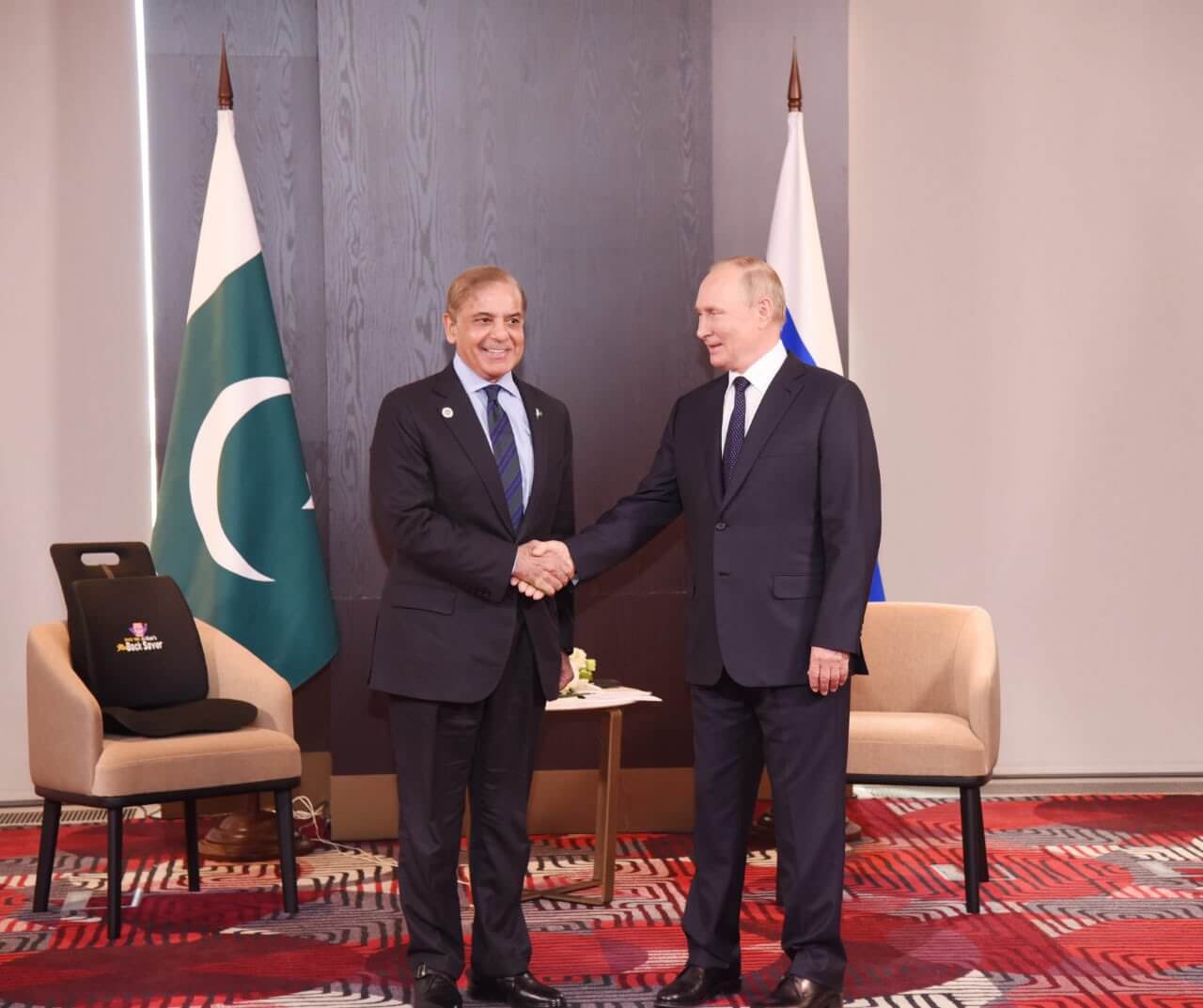In a balancing act amid the Russia-Ukraine war, Pakistan Prime Minister (PM) Shehbaz Sharif on Thursday reaffirmed during a meeting with his Russian counterpart Vladimir Putin along the sidelines of the Shanghai Cooperation Organisation Summit in Samarkand that their bilateral ties function “on [their] own” and are “not at the cost of any other country.”
Describing Moscow as a “superpower,” Sharif asserted that Islamabad is keen on cementing its ties with the Kremlin with “full commitment and full dedication” and “stands to gain from this mutual cooperation, mutual understanding, promoting trade, investment, and other areas like gas pipelines.”
The sentiment was echoed by Putin, who hailed Pakistan as a “priority partner in Asia” and highlighted that the two nations’ ties are “developing absolutely positively.”
Prime Minister Shehbaz Sharif’s meeting with President Vladimir Putin is of high significance as Russia sits on a veto power in the UN Security Council. pic.twitter.com/YT7y8D2S2q
— Muhammad Ibrahim Qazi (@miqazi) September 15, 2022
In this regard, he called for the completion of the $2.5 billion Russia-Pakistan Stream natural gas pipeline project, stability and security in Afghanistan, increased trade and investment, and humanitarian assistance against the backdrop of floods that have submerged one-third of the country and killed over 1,300 people.
Putin acknowledged “Pakistan’s ability to influence the situation” in Afghanistan and emphasised that the two countries hold a shared interest in reinforcing political stability in the country.
Additionally, he said that while bilateral trade had “somewhat subsided because of the pandemic,” he is optimistic that the next intergovernmental meeting in Karachi will “not only find ways to restore mutual trade but also to increase it.” Furthermore, he noted that the gas pipeline project will strengthen energy security for Pakistan at a time when it battles depleting reserves.
First meeting of Pakistan PM Shehbaz Sharif w/ Russian President Vladimir #Putin. Incidentally, Sharif’s predecessor Imran Khan had landed in Moscow in February, the day the invasion of #Ukraine happened & said “so much excitement”. Much has changed in 7 months. pic.twitter.com/GZdSbasZCJ
— Maha Siddiqui (@SiddiquiMaha) September 15, 2022
Thursday’s engagement marks the first meeting between the two leaders since Sharif took charge on April 10 after former PM Imran Khan’s ouster. The meeting comes against the backdrop of the Kremlin’s prolonged “special military operation” in Ukraine, wherein the Pakistani leadership’s stance on the war has influenced its ties with Russia over the last six months.
While Sharif’s predecessor chose a path of neutrality and refrained from condemning Russia’s invasion, Pakistan has exhibited a marked shift in recent times.
Gas pipeline started out as 100% Russian BOT project in 2015. It is now proposed to have only 26% Russian stake. Given that Pakistan-Iran pipeline has been stalled for since 1995 due to lack of finance on Pakistan’s side, how realistic is a Russia-Pakistan pipeline? 2/2 https://t.co/QlwWkihuWr
— Husain Haqqani (@husainhaqqani) February 25, 2022
For instance, reports have suggested that the Ukrainian military has procured arms and ammunition from the Pakistan Ordnance Factory, including the 122mm Howitzer Projectiles. In fact, the Ukraine Weapons Tracker even claimed that the projectiles could have been manufactured “explicitly for export to Ukraine.”
Additionally, the Economic Times reported last month that the Nur Khan air base in Rawalpindi has served as an air bridge to supply western weaponry to Ukraine. In August, a British Air Force C-17A Globemaster III carrying arms crossed over the Pakistani air bridge and landed in Romania.
In fact, Islamabad’s military bonhomie with Kyiv goes way back, with $1.6 billion in arms contracts between 1991 and 2020. There are currently 320 Ukrainian T-80UD tanks in service with the Pakistani army.
#Ukraine: The massive needs of the Ukrainian Army when it comes to artillery are being met from some unorthodox sources- Ukrainian artillerymen were spotted using 122mm HE artillery projectiles made by Pakistani Ordnance Factories (POF) 🇵🇰. pic.twitter.com/Uu8X1zT6wi
— 🇺🇦 Ukraine Weapons Tracker (@UAWeapons) August 30, 2022
Pakistan’s foreign ministry also dispatched $335,000 in humanitarian assistance to Ukraine in March.
Furthermore, the two have historically shared strong diplomatic ties, with Ukraine repeatedly backing Pakistan in the United Nations against India’s 1998 nuclear tests and the Kashmir issue.
This long-held camaraderie even prompted Pakistani Army Chief General Qamar Javed Bajwa in April to condemn Russia’s invasion for having inflicted a “huge tragedy” upon Ukrainians. He blamed Russia for the “thousands of people killed, millions made refugees and half of Ukraine destroyed.”
Bajwa’s remarks reflected a significant departure from Khan’s neutrality over the conflict. In fact, Khan visited Moscow on 24 February, the same day the Ukraine war began. He sparked controversy immediately after landing for commenting “What a time I have come… so much excitement!”
IK says that without 'powerful people' the conspiracy against his govt couldn't have been successful once again accusing Pakistan's Army of being behind his ouster.
— Hamza Azhar Salam (@HamzaAzhrSalam) September 15, 2022
This statement comes as PM Shehbaz Sharif met Russian President Vladimir Putin in Samarkand today. pic.twitter.com/NhjoiFRPNT
Khan’s pro-Russia tilt was also evident after he signed a bilateral trade deal with Moscow in March to import two million tonnes of wheat and natural gas. In fact, Khan even accused the United States of plotting a “conspiracy” to interfere in the no-confidence vote to oust him owing to his “principled and nonpartisan position” on the war. The former PM has also repeatedly praised India for its “independent foreign policy” by pointing to how it has resisted “sustained” Western pressure to avoid purchasing Russian oil.
Against this backdrop, Thursday’s meeting between Putin and Sharif seemingly serves as a balancing act and grants renewed momentum to bilateral relations that have for long held multiple mutual convergences over the Afghanistan Peace Process, joint military manoeuvres, and counterterrorism operations. The Sharif government has also welcomed the Kremlin’s offer of humanitarian aid to support Pakistan’s recovery from the devastating floods last month.

